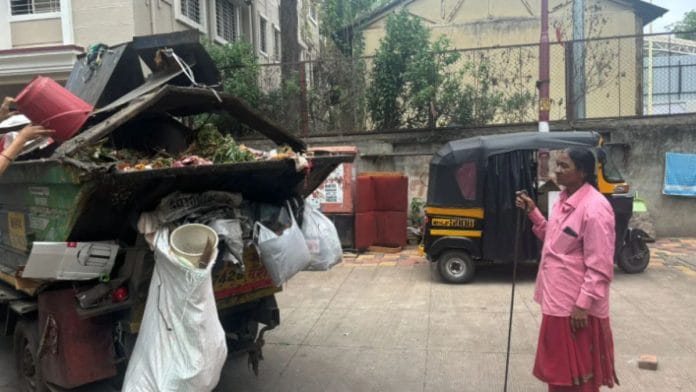Indumathi, a single mother of two kids in Bengaluru, was deep in debt and would struggle to put food on the table in 2010. She juggled four jobs a day – including as a free-roaming waste picker, a critical profession in India though largely invisible to the rest of us. When not ignored, she would be met with suspicion and hostility from cops and residents alike. This changed significantly when she received an identity card issued by the local municipal corporation, granting her recognition for her work.
With a vision to uplift others and bring dignity to the job, she began operating dry waste collection centres in 2016, which were set up by the local municipality with the intention of decentralizing waste management and offering opportunities for informal waste pickers. Today, she is the proud owner of two thriving enterprises, which have created jobs for over 200 women. She is now the voice of a group so often considered on the fringes of society and economic growth, representing Asian waste pickers at the United Nations Intergovernmental Negotiations Committee in Uruguay, and was recognized as Social Entrepreneur of the Year by Namma Bengaluru Foundation in 2023.
As a waste picker turned micro-entrepreneur, hers is a tale of inspiration, particularly for India’s 1.5 to 2.2 million estimated informal waste pickers, many of whom are women and the elderly. They form the indispensable yet invisible hands behind the collection, cleaning, and sorting of the nation’s 62 million tonnes of waste produced annually, of which only 19% is treated. Despite forming the foundation of the waste management ecosystem – with an average waste picker collecting anywhere between 60 and 90 kgs of waste a day, over 8 to 10 hours – they are vastly undervalued and overlooked. For example, they earn an income lower than kabadiwalas and junk dealers and lack social security benefits. Furthermore, waste pickers endure health hazards (from exposure to biomedical waste to various bacterial and viral diseases, alongside anemia and malnutrition), unhygienic conditions, harassment, and discrimination regularly. Often, they lead extremely vulnerable lives.
Also read: Over 14,000 tonnes of municipal solid waste generated in Delhi-NCR each day, Centre tells SC
Now, with various consumption-based industries set on transitioning to a circular economy, and the growing demand for regenerated plastic, we find ourselves at a critical junction: as we progress towards circularity, which can pave the path for a sustainable planet, it is our imperative to approach this shift with social inclusivity at the heart of it – bringing waste pickers on the margins into the fold, and giving them a voice and opportunity to participate in the economic value chain of waste recycling.
As we consider the road ahead, one key phrase comes to mind: Inclusive circularity. This forms a guiding principle that we must deeply ingrain into our processes – ensuring that, in our move towards a more sustainable future, the involved workers and communities are brought into the dialogue and well-equipped for change with time, and the promise of upskilling, access to resources, and better economic opportunities for underserved populations.
To replace a system where the recyclables picked and sorted by the waste pickers are conferred value only once they reach the final stages of the value chain, with them getting the least returns, to a future where waste pickers gain agency, have a pathway to break the chains of intergenerational poverty, live with a greater sense of security, and where their fundamental needs are met holistically (across education, housing, access to water and sanitation, and beyond). This model presents much cause for optimism: we can turn the tide of systemic inequalities and safeguard a vulnerable population, protect the planet, and propel economic gains. Such a shift will not be without challenges – redefining how stakeholders in a network collaborate, build bridges between previously disparate ideas – people and the planet, with social equity underlying these measures, are considerable demands. However, they’re not impossible to meet.
One crucial step to secure inclusivity in the value chain is to ensure that the various stakeholders involved, whether businesses, investors, or consumers, understand the value of waste pickers in the wider scheme of things – from the potential social to economic benefits. This can lead them to build systems in a manner that safeguards and enhances this community’s labour force participation and livelihoods. By creating spaces that help spark such meaningful conversations, we can encourage multi-stakeholder collaborations to drive collective social impact at scale, cascading important solutions for problems across different aspects of a waste picker’s life. Such collectives also hold great potential to attract impact-geared investors and generate innovative and technology-led tools for transformation, with the potential to improve effective waste management while upholding values of inclusion.
Integrating waste pickers, the backbone of India’s waste ecosystem, into circular and inclusive value chains, reflects a significant progressive step towards a more socially equitable, thriving world. We can’t do this alone – but the winds are shifting as more stakeholders are recognizing the importance of turning waste to value and the role of the primary stakeholder, and this can lead to this transformation.
At charcha ‘24, organized by The/Nudge Forum, India’s foremost collaborative convening, a multitude of industry experts and partners converged to explore various topics. With 35+ sessions spanning across 12 immersive, livelihood-intersecting themes, supported by 20+ sector-leading co-hosts, charcha convened to collaborate towards the shared goal of Viksit and Inclusive Bharat by 2047.
Charcha is an initiative towards closing the distance between samaaj, sarkaar and bazaar, (society, government and markets) and was held at India Habitat Centre, New Delhi from August 20-22, 2024
Akshay Soni is the managing partner, The/Nudge Institute. ThePrint is a media partner for charcha, organised by The/Nudge Institute.






